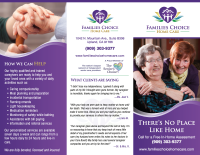90% of seniors report wanting to age in place.
With a growing older adult population, there will be a great deal of support needed from social workers, nurses, and other healthcare providers. In fact, geriatric social work is one of the fastest-growing fields in social work.
For those considering careers in social work specializing in gerontology, or family members who are serving as the caregivers for their older relatives, these helpful senior care tips can help you navigate the many different components that are important to the overall health of older adults.
Read on to get the elderly care advice you need to help your clients and family members age in comfort and with the dignity they deserve.
1. Make Sure the Living Space Is Safe
Caregivers and family members must evaluate the safety of the home or living space where their loved ones or clients reside.
Sometimes safety modifications and improvements should be made to prevent falls, which is a leading cause of injury, death, and nursing home admissions in the older adult population. About 70% of accidental deaths in people over the age of 75 result from falls, and 40% of nursing home admissions are due to falls in the home.
The great news is, falls can easily be prevented with safety modifications. Modifications could include inexpensive items that make a huge difference, like grab bars, handrails, and improved lighting. Smoke detectors, fire extinguishers, and carbon monoxide detectors, if needed, should always be checked regularly to make sure they’re working.
Contact us today if you’re interested in a free fall prevention workshop for your group.
2. Provide Opportunities for Social Activities
Social isolation is a serious problem for many seniors who live at home by themselves. Older adults must be provided with opportunities to engage in conversation, participate in community activities, and/or be a regular part of family activities.
Social workers who care for seniors are responsible for much more than just physical health and need to take a holistic approach, making sure to think about emotional well-being, connection to their community, and much more.
A conversation with a loved one in person or over the phone, playing a game with a social worker, doing a puzzle, or cooking a meal with a home health care aid can make a big difference in an otherwise isolating day.
3. Make Healthy Meals and Snack Choices a Priority
If your loved one is unable to go to the store, go grocery shopping for them and make sure to purchase healthy options that are easy to prepare. A healthy diet is important for mental and physical health.
If you are the one responsible for caring for your loved one and your schedule doesn’t permit you to handle these tasks, there are often excellent and reliable home care agencies that offer these types of senior services.
Often health aides come over in the morning. Consider asking your loved one’s helper to cook a healthy breakfast when they arrive. Ask them to cut up some extra fruit and veggies and leave them in the fridge for your loved one to munch on throughout the day.
4. Educate Yourself About Dementia
According to the World Health Organization, there are an estimated 50 million people worldwide living with dementia. For those considering a career in social work with the older adult population, it’s essential to become educated about this prevalent syndrome.
Social workers should be prepared to offer guidance and support to both their clients suffering from dementia and their families. Family members may seek the advice of social workers when they’re feeling burned out or considering whether or not their loved one needs to be placed in a nursing home.
Family members caring for loved ones should make sure to be on the lookout for warning signs of dementia including, forgetfulness, losing track of time, and becoming disoriented or lost in places that should be familiar.
5. Get Senior Care Tips From Local Community Agencies
There are often a lot of great community resources available to seniors and their caregivers. If you are a social worker, you should be able to refer families to a variety of community resources. Familiarize yourself with everything from meal delivery services, like Meals on Wheels, the top nursing homes in your community, and the local YMCA, where they offer physical fitness and socialization opportunities for seniors.
If you’re a family member navigating your loved one’s care on your own, try your local Area Agency on the Aging first. They can often point you in the right direction.
6. Be Ready to Help Families Navigate Difficult Decisions
Social workers who work with older adults are there to help give families elderly care advice, often on difficult decisions. One of the most challenging questions for families to navigate is whether or not their loved one needs to be placed in an assisted living facility.
Families are trusting professionals with their loved ones. Be prepared to help them weigh difficult decisions. Some common questions that families may come to you with include:
- How can I cope with the stress of caring for my loved one?
- How do I know that it’s time to put my loved one in an assisted living facility?
- Are there support programs available to my loved one?
7. Financial Management
Older adults are on a fixed income, and that makes financial management crucial. It takes time and careful attention to manage the plethora of paperwork, bills, applications, taxes, and other items that directly affect the financial health of an individual.
Sometimes family members can assist their loved one, but they’re not always available or reliable. There are services available to older adults that assist with financial management services.
Social workers should familiarize themselves with federal programs like Social Security and Medicare, free tax preparation programs for seniors, bill paying services, and other financial management resources.
Help Your Clients’ and Loved Ones’ Ages With Dignity
Utilize these senior care tips to provide your clients and loved ones with the care and resources to help them age comfortably and joyfully.
Contact us today to learn more about home care services, respite care, and fall prevention workshops.






